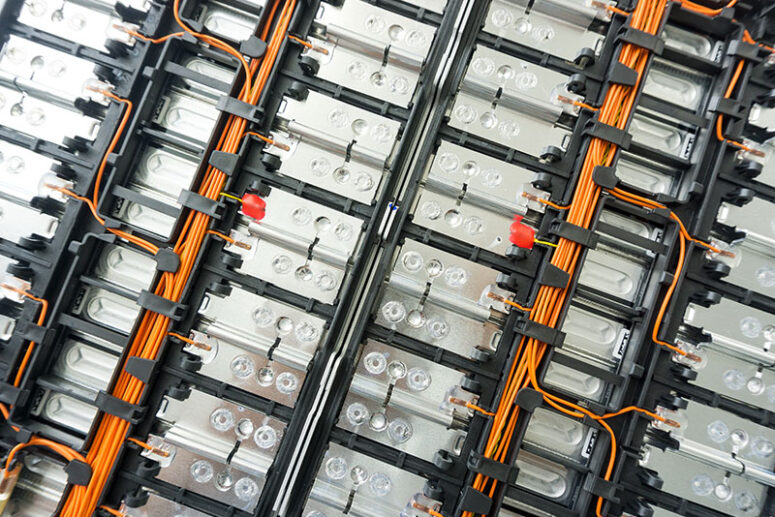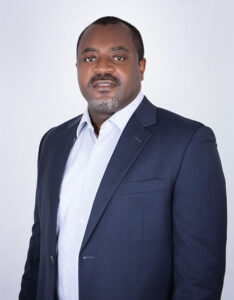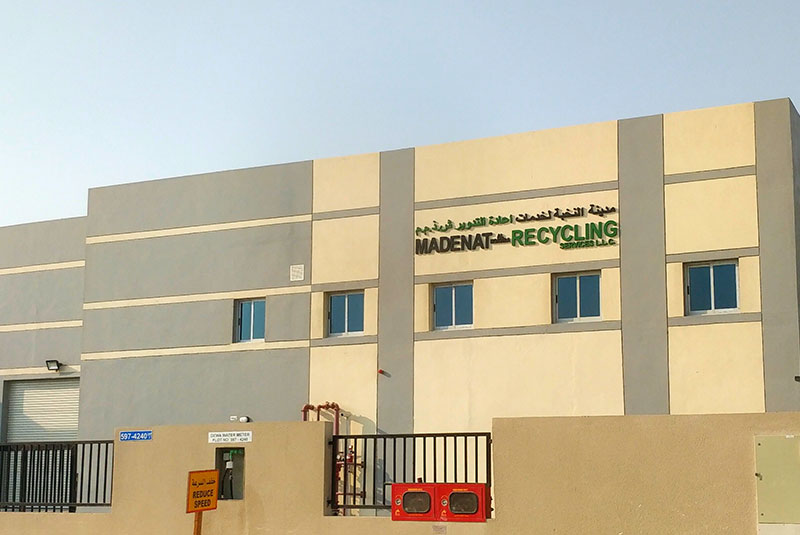
Joseph Nforbin, Managing Director, Madenat Al Nokhba Recycling Services LLC, talks about the company’s newly launched Lithium-Ion Battery Processing Unit, and its significance in the region.
From powering smartphones to electric vehicles, lithium-ion batteries have become an indispensable part of our lives. While these batteries have revolutionised energy storage and transportation, they bring a significant challenge when it comes to recycling and disposal. The surge in usage of electronic devices and EVs, especially in the Gulf Cooperation Council (GCC), has raised concerns over environmental impact and the need for responsible recycling. Committed to address this issue and help the region tread the sustainability path, Madenat Al Nokhba Recycling Services LLC has inaugurated its Lithium-Ion Battery Processing Unit in Dubai.
Equipped with ground-breaking technology and years of expertise in e-waste and battery recycling, the Madenat Al Nokhba Recycling team is all set to transform the battery recycling landscape in the GCC. Its innovative technology promises to not only efficiently recycle lithium-ion batteries but also extract valuable materials, reduce environmental impact, and contribute to the region’s sustainability goals.
Madenat’s Lithium-Ion Battery Processing Unit

Commenting on the new facility, Joseph Nforbin, Managing Director, Madenat Al Nokhba Recycling Services LLC said, “The Lithium-Ion Battery Processing Unit is a state-of-the-art solution designed to address the specific challenges posed by discarded batteries, particularly lithium-ion batteries. These batteries, while essential for powering our devices and renewable energy systems, also contain valuable materials like lithium, cobalt, and nickel, which are crucial for the production of new batteries.” The facility will recycle all types of lithium-ion batteries ranging from smartphones and laptops to electric vehicles, power tools, portable electronics and renewable energy systems. “The scalable operations capacity of our plant is 10,000 metric tonnes a year,” he added.
Founded in 2015, Madenat Recycling has always been future-ready with different recycling plants to recycle all kinds of Waste Electrical & Electronic Equipment (WEEE). It recycles e-waste, batteries, spent lamps, and cables along with aerosol cans, hazardous waste, and special waste. The addition of the Lithium-Ion Battery Processing Unit supports Madenat’s commitment to zero landfill and sustainable development. “It showcases our dedication to adopting innovative solutions to address pressing global challenges,” Nforbin noted.
A game-changer in the recycling industry
Madenat’s technology goes beyond the basics and provides battery-grade materials ready for new battery manufacturing, he highlighted.
“Our mechanical cutting-edge technology is a game-changer in the recycling industry, transcending the boundaries of conventional methods. The advanced mechanical recycling technology for lithium-ion batteries comprises an array of remarkable features, making the recycling process a smooth sail even for the most complex lithium-ion batteries,” the MD explained. The technology manifests sophistication in handling batteries, beginning from a disassembly step and proceeding with processes involving shredding, grinding, crushing, and finally, sieving. “These procedures account for the effective separation of high-value materials from foils and casing. Its safe, efficient, and also environmentally conscious approaches are what make it the best in the business. Through this procedure, we aim to produce the ‘black mass,’ a resourceful commodity instrumental in producing battery-grade metal salts,” he stated.
Safety and efficiency factors
The widespread adoption of lithium batteries also brings about concerns regarding resource depletion, environmental impact, and waste management. Traditional recycling methods are often inadequate to handle the complexity of lithium-ion batteries, which contain hazardous materials and valuable resources that need to be carefully managed.
The new facility employs cutting-edge processes to ensure the safe and efficient recycling of batteries. “The processing unit comes with advanced robotics and automation to safely disassemble lithium-ion batteries, ensuring minimal risk to human workers and maximum material recovery. One of the standout features of this unit is its ability to recover a wide range of valuable materials.” Batteries contain valuable and limited resources, such as metals (e.g., lithium, cobalt, nickel) and rare earth elements. Recycling batteries allow these resources to be recovered and reused in the manufacturing of new batteries or other products, reducing the need for new resource extraction and the associated environmental impact.
“To address potential safety concerns associated with the recycling of batteries,” Nforbin noted, “We recommend and follow the practice of using non-conductive tape, preferably electrical tape, to tape the battery terminals or connections, preventing any unwanted contact and potential fires.” Madenat is also spreading awareness about proper storage and recycling methods. “We encourage people to be a part of the solution and not the problem.”

Challenges and opportunities
“Li-ion batteries power a broad spectrum of devices and are praised for their high energy density and long life. However, recycling them presents unique challenges due to their complex chemistry and construction,” he explained. “They can cause fires during transportation or at recycling facilities due to battery terminal contact, requiring particular handling provisions. Also, each category requires a tailored approach to efficiently recover precious materials like lithium, cobalt, and nickel.” Hence, maintaining a high standard with safety protocol in place is crucial, he said.
There is a standard recycling process for any recyclable that arrives at the facility. The WEEE received in the facility is first weighed, sorted, and separated into various waste categories (for example, hazardous and non-hazardous) and everything is recorded and documented. Larger items (like white goods) are dismantled manually into various material components and then recycled per material component using advanced automated E-waste machines. Items that fall under the category of hazardous waste such as used lighting systems – fluorescent tube lights/bulbs/lamps, once received at Madenat’s facility, are loaded to the lamps processing plant which operates an advanced automated system that doesn’t only crush the glass but also separates the phosphorus powder from the glass. This further goes through a distillation process to produce refined mercury. It is then used for manufacturing medical devices, such as thermometers.
Being future-ready
The future of lithium-ion battery recycling is likely to be shaped by a combination of technological advancements, regulatory developments, and a growing emphasis on sustainability. This has significantly influenced the increasing demand for lithium-ion battery recycling. This trend is likely to continue as the use of such batteries becomes even more widespread across various industries. As the demand for batteries continues to rise, the recycling industry is expected to play a crucial role in mitigating environmental impact and ensuring the responsible management of end-of-life batteries.
Pivotal moment in the GCC region
The introduction of the Lithium-Ion Battery Processing Unit marks a pivotal moment in the GCC’s recycling journey, positioning the region as a leader in sustainable practices and technological innovation. By efficiently recycling lithium-ion batteries and extracting valuable materials, this cutting-edge technology promises to reduce waste, conserve resources, and contribute to a more circular and sustainable economy. As Madenat Recycling continues to invest in forward-thinking solutions, it paves the way for a greener and more environmentally conscious future.
Nforbin pointed out, “The GCC region’s rapid growth has led to a heavy reliance on imported materials, including those required for battery production. Embracing lithium
battery recycling contributes to the concept of a circular economy, where products and materials are reused, repaired, or recycled to minimise waste.” Constant innovations in the recycling industry encourage a closed-loop system for lithium batteries in the GCC region including UAE, reducing the need for raw materials extraction and decreasing the environmental impact associated with battery production, he highlighted. “With Madenat’s Lithium-Ion Battery Processing Unit, the GCC can establish a degree of resource independence,” he stated. By effectively recycling these batteries and reintegrating recovered materials into new products, the processing unit helps reduce the carbon footprint associated with mining and refining raw materials.
“Embracing innovation and sustainability, our latest battery recycling unit is a testament to our unwavering commitment to a greener future. Turning yesterday’s power sources into tomorrow’s possibilities, we’re not just recycling batteries; we’re recharging hope for a cleaner world,” Nforbin said, adding, “Together, we’re writing a new chapter in conservation, ensuring that progress is powered by a circular economy that leaves no trace behind.”
For more details visit www.madenatrecycling.ae or call at +971 43271778.
